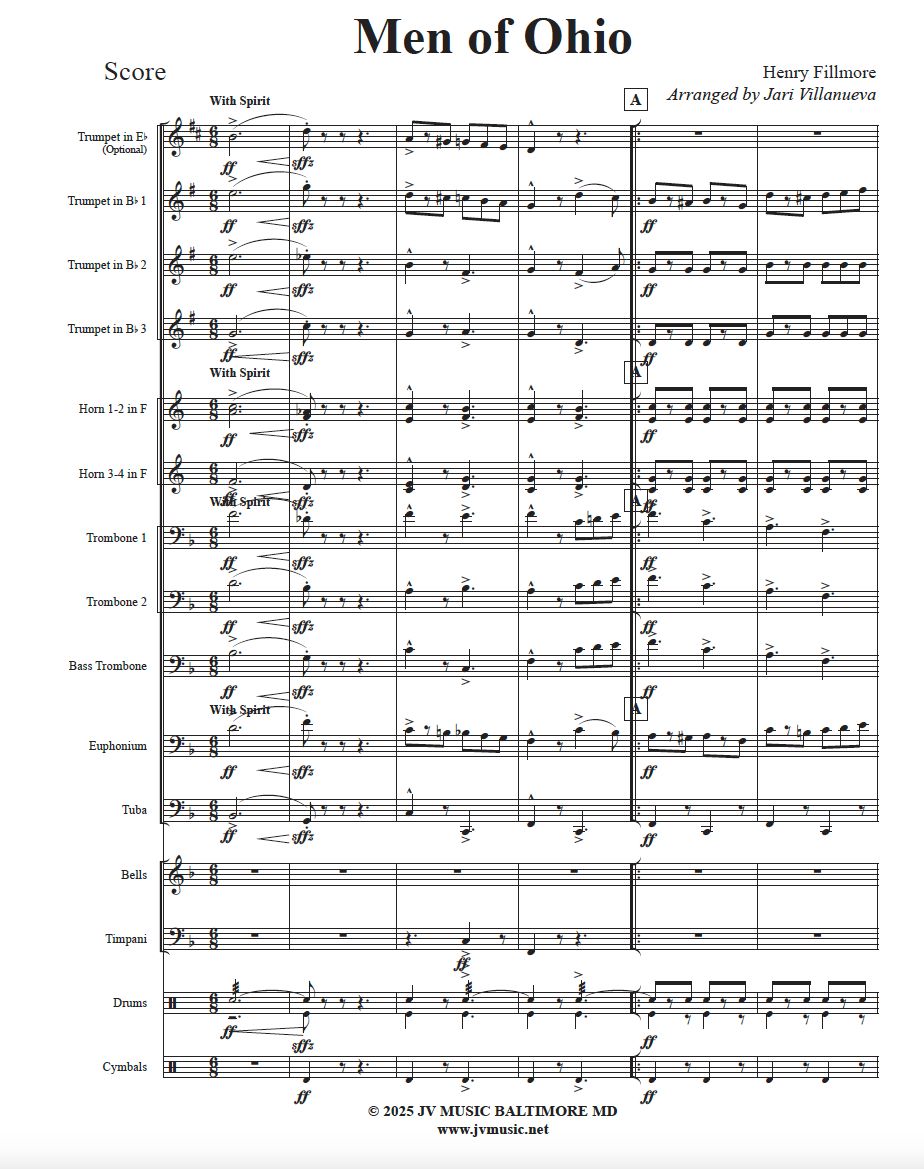

The JV Music Store: If Your Question Has the Word Music in It, Look No Further!
Welcome to the JV Music store! We are your source for finding arrangements for Brass Quintet, Brass Ensembles, Concert Band and more.
All our arrangements are by Jari Villanueva, a former member of the Air Force, where he served for 23 years with the United States Air Force Band in Washington, DC. During his time in the band, he held various roles, including trumpeter, bugler, assistant drum major, staff arranger, and music copyist. He is regarded as the country’s foremost expert on military bugle calls, particularly the call of Taps, which is played at military funerals.
Men of Ohio for Brass Ensemble Henry Fillmore
Men of Ohio Henry Fillmore Arranged by Jari Villanueva
Score
Eb Cornet (Opt.)
3 Trumpets in Bb
4 Horns in F
2 Trombones
Bass Trombone
Euphonium (Baritone TC)
Tuba
Bells
Timpani
Drums
SCORE AND PARTS DOWNLOADED UPON PAYMENT
Henry Fillmore (December 31, 1881, Cincinnati, Ohio - December 7, 1956, Miami, Fla.) was an American composer and publisher. The eldest of five children, he mastered the piano, guitar, violin, and flute — as well as the trombone. He began composing at 18, with his first published march, Higham, named after a line of brass instruments. Fillmore entered the Cincinnati Conservatory of Music in 1901. Afterward, he traveled around the United States as a circus bandmaster with his wife, an exotic dancer named Mabel May Jones.
Fillmore composed over 250 tunes and arranged hundreds more. He also published many songs under various pseudonyms like Harold Bennett, Ray Hall, Harry Hartley, Al Hayes, and the humorous Henrietta Hall. While best known for march music and screamers, Fillmore also wrote waltzes, foxtrots, hymns, novelty numbers, overtures, and more waltzes.
Henry Fillmore moved from Cincinnati, Ohio, to Miami in 1938 after a doctor told him he had six months to live. The doctor suggested that moving to a warmer climate might increase his chances of living longer. Following the doctor's advice, the Fillmores relocated to Miami, hoping to improve Henry's health. It apparently worked, as they lived happily there until their deaths in the 1950s.
Fillmore dedicated Men of Ohio "To the President, Warren G. Harding, and his staunch Loyalists" in 1921, the year Harding became the 29th president of the United States. Harding had played alto horn in his hometown band of Caledonia and later, in Marion, Ohio, where his family moved. He also enjoyed boxing, motoring, fishing, baseball, card playing, and golfing. In 1920, the "small-town hero" took advantage of the American mood against the restrictions of the war years and ran a successful campaign for the nation's highest office. His popularity in that office was tarnished after two of his political appointees were convicted of graft and sent to prison. In an effort to regain the confidence of the American people in himself and his Republican Party members, Harding undertook a rigorous speaking schedule that left him completely exhausted. A stroke followed, and he died in August 1923.
